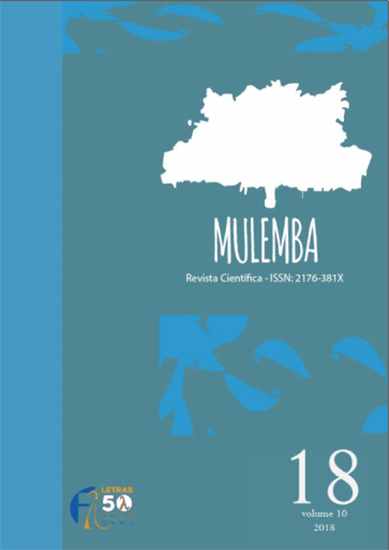About water and people: identity writing
DOI:
https://doi.org/10.35520/mulemba.2018.v10n18a15361Keywords:
João Paulo Borges Coelho, water, tradition, identity, Mozambique.Abstract
The fictional production of João Paulo Borges Coelho currently represents an important contribution to the rethinking of identity issues in the Mozambican space, through the recovery of collective memory, both pre- and post-independence. In Água. Uma novela rural - Water. A rural novel (2016), the author resumes the representation of rivers as a central metaphor in the construction of the narrative, presenting a pertinent reflection on the construction of identities, in a complex relationship between tradition and modernity, countryside and city, native and foreign, young and old. The situation of extreme drought in the village aggravates latent social conflicts, and the novel unfolds in a dialogue punctuated by perplexity and contradictions, similar to the water itself, which is not to be trusted, as the narrator warns, early in the novel. Scarce at first, then torrential, water punctuates the lives of the people and signals the arrival of a time when the borders are crumbling and blending becomes necessary.
Downloads
References
ASHCROFT, Bill; GRIFFITHS, Gareth; TIFFIN, Helen. Introduction to Part Eightneen. Environment. The Post-Colonial Studies Reader. New York: Routledge, 2006.
CHEVALIER, Jean; GHEERBRANT, Alain. Dicionário de símbolos: mitos, sonhos, costumes, gestos, formas, figuras, cores, números. Rio de Janeiro: José Olympio, 11ª ed., 2009.
CHABAL, Patrick. Vozes Moçambicanas. Literatura e Nacionalidade. Lisboa: Vega, 1994.
COELHO, João Paulo Borges. Água. Uma novela rural. Lisboa: Caminho, 2016.
COELHO, João Paulo Borges. Entrevista a João Paulo Borges Coelho por António Rodrigues, 27.07.2016. Disponível em http://www.redeangola.info/especiais/as-sociedades-estao-em-ruptura-e-a-tradicao-nao-da-resposta-a-problemas-desta-magnitude/. Acesso em 10 maio 2017.
CROSBY, Alfred W. Ecological Imperialism: the biological expansion of Europe, 900-1900. New York: Cambridge University Press, 1986.
FONSECA, Ana Margarida. Líquidas fronteiras: representações dos rios em As Duas Sombras do Rio e Campo de Trânsito. In Sheila Khan, Sandra Sousa et alii (org.) Visitas a João Paulo Borges Coelho. Leituras, diálogos e futuros. Lisboa: Colibri, 2017.
GROVE, Richard Green. Imperialism: Colonial Expansion , Tropical Island Edens and the Origins of Environmentalism , 1600-1860. Cambridge: Cambridge University Press, 1995.
HUGGAN, Graham; TIFFIN, Helen. Postcolonial Ecocriticism: Literature, Animals, Environment. London and New York: Routledge, 2010.
ONG, Walter J. Orality and Literacy: The Technologizing of the Word. Ney York: Routledge, 1982.
REIS, Carlos; LOPES, Ana Cristina. Dicionário de Narratologia. Coimbra: Almedina, 1991.
STEVENS, Anthony. Ariadne's Clue: a guide to the symbols of human kind. Princeton/New Jersey: Princeton University Press, 1998.
Downloads
Published
Issue
Section
License
Authors who publish with this journal agree to the following terms:
- Authors retain copyright and grant the journal right of first publication with the work simultaneously licensed under a Creative Commons Attribution License that allows others to share the work with an acknowledgement of the work's authorship and initial publication in this journal.
- Authors are able to enter into separate, additional contractual arrangements for the non-exclusive distribution of the journal's published version of the work (e.g., post it to an institutional repository or publish it in a book), with an acknowledgement of its initial publication in this journal.
- Authors are permitted and encouraged to post their work online (e.g., in institutional repositories or on their website) prior to and during the submission process, as it can lead to productive exchanges, as well as earlier and greater citation of published work (See The Effect of Open Access).

